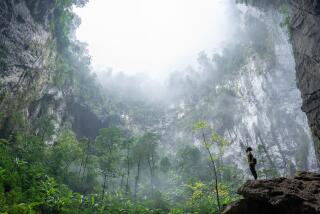Review: ‘Earth’ examines the big picture in the San Fernando Valley and around the globe
- Share via
Whatever else can be said about the human race, no one can claim we’ve been idle. In fact, according to the completely fascinating, unexpectedly compelling documentary “Earth,” we move billions of tons of earth annually, making humanity a greater physical force on our planet than nature itself.
Exploring this phenomenon with his usual depth is Austrian documentarian Nikolas Geyrhalter, responsible for 2005’s equally powerful “Our Daily Bread” and a big-picture filmmaker in more ways than one.
A director who does his own camerawork and has a keen eye for arresting imagery, Geyrhalter possesses an unmistakable visual style. He prefers, as do such celebrated German still photographers as Thomas Struth and Andreas Gursky, to take a step back and utilize large-scale images composed at a distance.
Approaching the world in his own specific visual way, Geyrhalter also gravitates toward exploring big ideas, and here he takes on one of the biggest, an exploration of, as he puts it, “the wounds we are inflicting on the Earth.”
If this sounds too didactic, be assured that the director is not interested in going down that road. “Just becoming outraged about things is too easy,” he’s said. “Each of my films contains criticism of civilization, and, at the same time, I would like people to understand why things are the way they are.”
To achieve this, Geyrhalter visits seven sites of unimaginably massive invasions of Earth. He first shows us an otherworldly view of the location from the air, then explores it on ground level, and finally, and this is new for him, interviews people who make a living off this process.
One of the first sites “Earth” investigates is not far away, an enormous building site in the San Fernando Valley, where trucks and earthmovers perform an intricate mechanical ballet, literally leveling a mountain to make room for an unnamed new development.
The no-frills interviews feature workers and supervisors simply standing and facing the camera. Their attitudes, here as elsewhere, are intriguingly ambivalent. They are aware of the environmental impact of what they do, but also take pride in it and feel if it wasn’t them doing it, it would be someone else.
If earth-moving in the Valley is familiar, the next stop, half a mile underneath a mountain on the Austria/Italy border to construct one of the longest rail tunnels ever built, is positively surreal, with the workers themselves commenting that being the first humans to see and touch material this far inside the Earth makes them feel like explorers.
Some sites, including Rio Tinto in Spain, exploited by the Romans and said to be perhaps the oldest copper mine in the world, are well known to historians and archaeologists.
More familiar to the general public is Italy’s Carrara, the center of marble mining for centuries but changing fast because of new technologies that what used to take two days can now be done in hours.
One of Carrara’s laborers, who describes his zeal for his work as “a passion, an adrenaline rush,” nevertheless worries about the future.
“If we keep going this fast, there won’t be any material left in 300 years,” he says. “And the children of our children will have to find something else.”
As “Earth” progresses, increasingly problematic situations are presented, such as the one in Wolfenbuttel, Germany, where scientists are concerned that radioactive waste stored in an old salt mine for decades may no longer be safe there.
Even grimmer is the scenario around Fort McKay in Canada, where members of the First Nations who live in the area bemoan the damage done to their surroundings by intensive extraction of oil.
“They are making holes in Mother Earth; can it be reclaimed?” a tribal environmental consultant worries, echoing the theme of the film. “We need the Earth to survive.”
'Earth'
Not rated
Running time: 1 hour, 55 minutes
Playing: Starts Feb. 7, Laemmle Glendale, Glendale; also Feb. 10-11, Laemmle Royal, West Los Angeles; Laemmle Town Center, Encino; Laemmle Playhouse 7, Pasadena; Laemmle Claremont
More to Read
Only good movies
Get the Indie Focus newsletter, Mark Olsen's weekly guide to the world of cinema.
You may occasionally receive promotional content from the Los Angeles Times.










